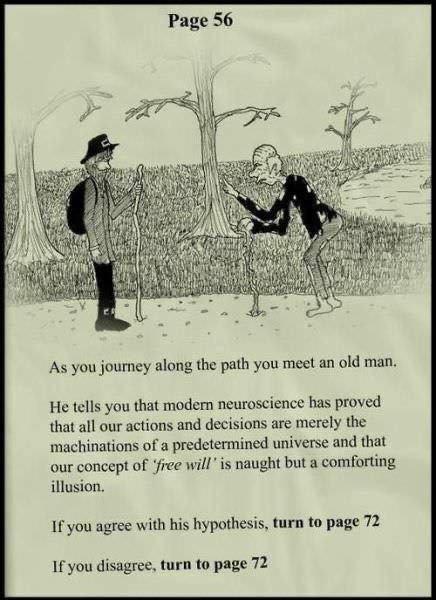this post was submitted on 05 Aug 2023
1160 points (97.6% liked)
internet funeral
6912 readers
1 users here now
ㅤㅤㅤㅤㅤㅤㅤㅤㅤㅤㅤㅤㅤㅤㅤㅤㅤㅤㅤㅤㅤㅤㅤㅤㅤㅤㅤㅤart of the internet
What is this place?
• !hmmm@lemmy.world with text and titles
• post obscure and surreal art with text
• nothing memetic, nothing boring
• unique textural art images
• Post only images or gifs (except for meta posts)
Guidlines
• no video posts are allowed
• No memes. Not even surreal ones. Post your memes on !surrealmemes@sh.itjust.works instead
• If your submission can be posted to !hmmm@lemmy.world (I.e. no text images), It should be posted there instead
This is a curated magazine. Post anything and everything. It will either stay up or be lost into the void.
founded 1 year ago
MODERATORS
you are viewing a single comment's thread
view the rest of the comments
view the rest of the comments

I don't wanna get into a whole thing about it, but physics makes no guarantee that events will play out the same way twice under time. The stochastic nature of the universe is that every particle interaction creates a whole universe of possibilities, virtual particles, and the tail ends of that possibility are almost endless. Physics may easily break its own "rules", with small probability
So your mechanistic view is that if you rewind time, all the billiard balls will get hit the same way. I my probabalistic view, something new will happen. Of course, we can't time travel, so the whole hypothesis is pointless and undefeasible
Do you have anything to back up this belief? I'm genuinely curious. Afaik the idea that we're affected by quantum phenomenon is speculative. Even so, it wouldn't necessarily grant us free will. Even assuming that we're directly affected by quantum uncertainty, it doesn't mean we have free will unless we're able to control how it affects us. Our neurons still have to follow the laws of physics, even if the particles within them occasionally appear to ignore them (and that's assuming we won't eventually discover that there are rules governing how and when particles are seemingly able to ignore physics).
At best I think you could say that we have free will at the individual level, even though in the background that free will is driven by chemicals and quantum interactions. Just like a car doesn’t have free will because it’s inanimate, it also isn’t solely jostled around by the environment because it is powered and steered in its own self contained manner. You can keep going down a level and point to this choice being driven by this neuron firing or that sensory input overriding some reflex, but since free will is just a an English phrase coined long before we had any idea of the mechanics, is fair to say that at some level we’re driving our lives in comparison to any external force, and that predestination is so incomprehensible at our level as to be meaningless and “that” is free will, while at the same time there’s nothing above or outside of our consciousness and physics literally steering our mind against the stream of physics allowing us to “decide” to make a decision, rather than simply making a decision based on the infinite flowchart the universe is following.
All of that, of course, is outside the argument of whether all of physics is really predetermined or if it really is just infinities relative dice rolls every time one quantum bundle interacts with other.
Yeah but you are still going to die. I don't get how everyone decided that just because we can't know anything means we can know nothing.
I can't tell you what the weather will be like on this day ten years from now exactly, but I can tell you that it highly likely to be hot and dry. It might not be possible to ever fully fully predict what a human would do but some level of prediction will always be possible and is gradually rising over time. Hence the social sciences.